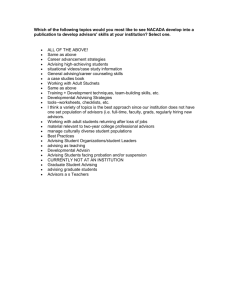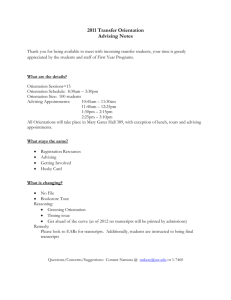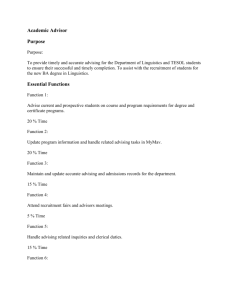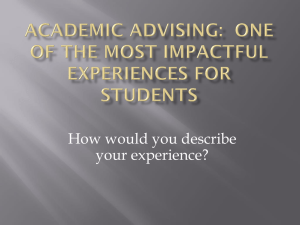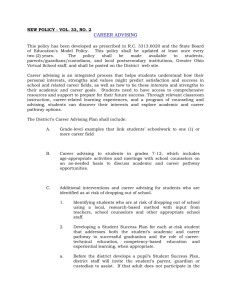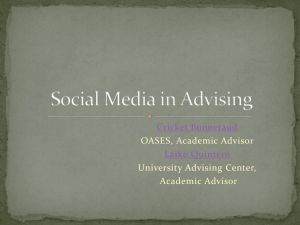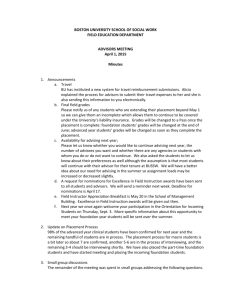Click here if you would like to read the proposal
advertisement
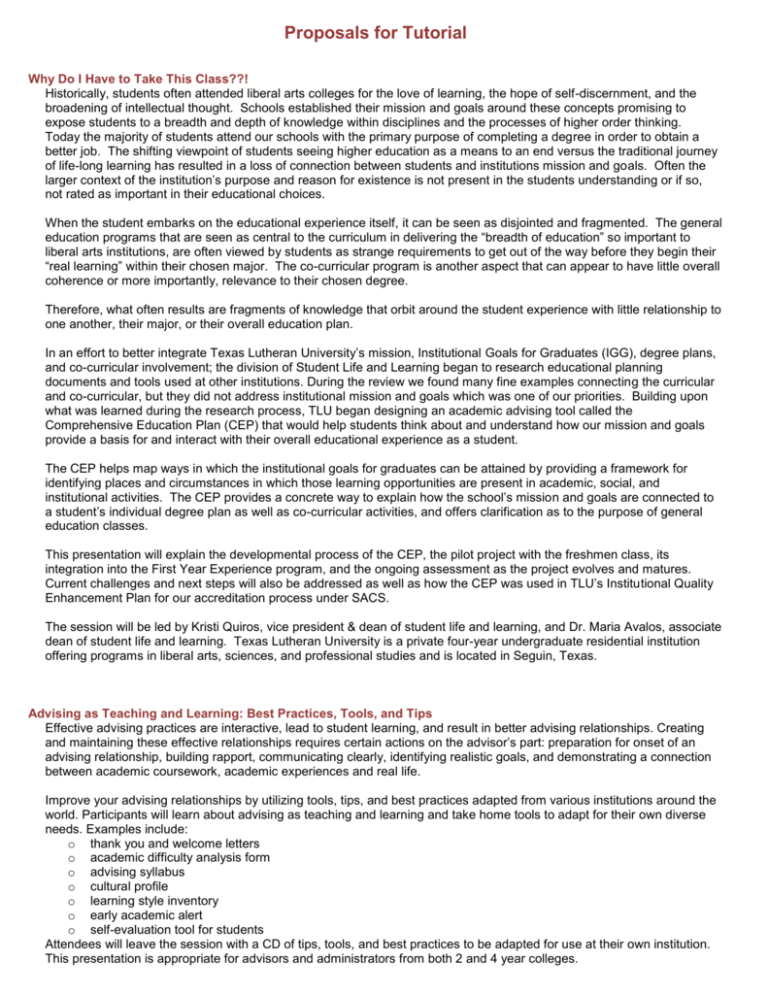
Proposals for Tutorial Why Do I Have to Take This Class??! Historically, students often attended liberal arts colleges for the love of learning, the hope of self-discernment, and the broadening of intellectual thought. Schools established their mission and goals around these concepts promising to expose students to a breadth and depth of knowledge within disciplines and the processes of higher order thinking. Today the majority of students attend our schools with the primary purpose of completing a degree in order to obtain a better job. The shifting viewpoint of students seeing higher education as a means to an end versus the traditional journey of life-long learning has resulted in a loss of connection between students and institutions mission and goals. Often the larger context of the institution’s purpose and reason for existence is not present in the students understanding or if so, not rated as important in their educational choices. When the student embarks on the educational experience itself, it can be seen as disjointed and fragmented. The general education programs that are seen as central to the curriculum in delivering the “breadth of education” so important to liberal arts institutions, are often viewed by students as strange requirements to get out of the way before they begin their “real learning” within their chosen major. The co-curricular program is another aspect that can appear to have little overall coherence or more importantly, relevance to their chosen degree. Therefore, what often results are fragments of knowledge that orbit around the student experience with little relationship to one another, their major, or their overall education plan. In an effort to better integrate Texas Lutheran University’s mission, Institutional Goals for Graduates (IGG), degree plans, and co-curricular involvement; the division of Student Life and Learning began to research educational planning documents and tools used at other institutions. During the review we found many fine examples connecting the curricular and co-curricular, but they did not address institutional mission and goals which was one of our priorities. Building upon what was learned during the research process, TLU began designing an academic advising tool called the Comprehensive Education Plan (CEP) that would help students think about and understand how our mission and goals provide a basis for and interact with their overall educational experience as a student. The CEP helps map ways in which the institutional goals for graduates can be attained by providing a framework for identifying places and circumstances in which those learning opportunities are present in academic, social, and institutional activities. The CEP provides a concrete way to explain how the school’s mission and goals are connected to a student’s individual degree plan as well as co-curricular activities, and offers clarification as to the purpose of general education classes. This presentation will explain the developmental process of the CEP, the pilot project with the freshmen class, its integration into the First Year Experience program, and the ongoing assessment as the project evolves and matures. Current challenges and next steps will also be addressed as well as how the CEP was used in TLU’s Institutional Quality Enhancement Plan for our accreditation process under SACS. The session will be led by Kristi Quiros, vice president & dean of student life and learning, and Dr. Maria Avalos, associate dean of student life and learning. Texas Lutheran University is a private four-year undergraduate residential institution offering programs in liberal arts, sciences, and professional studies and is located in Seguin, Texas. Advising as Teaching and Learning: Best Practices, Tools, and Tips Effective advising practices are interactive, lead to student learning, and result in better advising relationships. Creating and maintaining these effective relationships requires certain actions on the advisor’s part: preparation for onset of an advising relationship, building rapport, communicating clearly, identifying realistic goals, and demonstrating a connection between academic coursework, academic experiences and real life. Improve your advising relationships by utilizing tools, tips, and best practices adapted from various institutions around the world. Participants will learn about advising as teaching and learning and take home tools to adapt for their own diverse needs. Examples include: o thank you and welcome letters o academic difficulty analysis form o advising syllabus o cultural profile o learning style inventory o early academic alert o self-evaluation tool for students Attendees will leave the session with a CD of tips, tools, and best practices to be adapted for use at their own institution. This presentation is appropriate for advisors and administrators from both 2 and 4 year colleges. The Role of Trust in Advising Administration and Leadership The purpose of this presentation is to explore, through discussion, reflection, and activities, the importance of and means of acquiring and maintaining trust in the process of leading and administration of advising. As a result of this presentation, participants will be able to: 1) Define trust and identify the necessary components of both individual and organizational trust 2) Understand the reciprocal nature of trusting relationship 3) Identify and respond to the barriers they experience in relation to trusting others within the realm of administrative leadership 4) Discuss the benefits of trust and consequences of lack of trust within organizations 5) Be better able to develop a strategy for improving trust within their workplace The presentation outline is as follows: 1) Initial discussion wherein participants are invited to explore and discuss who they trust most from a list of options. 2) Participants will then be asked to reflect individually and in groups on what it is about themselves and other that causes them to trust or not trust another person and will attempt to define trust. 3) The presenter will provide a definition of trust and an overview of research based and theoretical models of individual trust and organizational trust. Participants will be invited to reflect on the distinctions between their own reflections and discussions and these models. 4) Discussion will then shift to the application of this research to the process of advising leadership. The presenter will provide research based suggestions from the trust literature on how to build and maintain trust, as well as what to do when trust is lost. 5) Participants and the presenter will discuss specific techniques and strategies for building trust based on the literature. Helping High-Achieving Students Develop Parallel Plans Talented students often set high professional goals for themselves, but what happens when competition or a change in their interests pushes them away from those goals? Stress and confusion can make the adjustment to a new direction very painful. Academic advisors help diffuse such stress by encouraging students to make parallel plans, alternatives with emotional and career satisfaction equal to students’ original goals. This panel of advisors from diverse institutional settings will address parallel planning strategies for use with pre-health students, minority students, those dealing with student development issues, and others. We will invite audience members to share their own success stories of assisting these competitive, high-achieving students.

